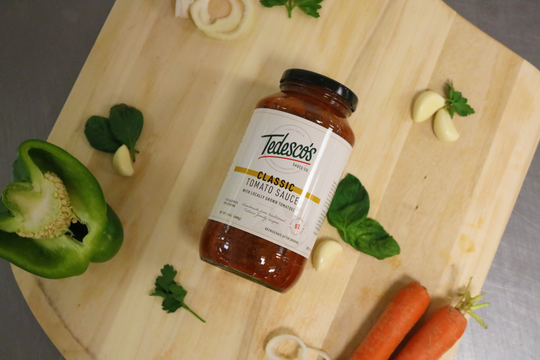Benefits of jarred tomato sauce vs canned
Some might say it’s a matter of preference, but at Tedesco’s, we’ve always used glass jars to preserve the flavor and taste of the locally grown tomatoes used to make our sauce. However, both jarred and canned tomato sauce can be convenient and tasty options for adding flavor to your meals.
One potential advantage of jarred tomato sauce is that it is typically sold in glass jars, which can be recycled or reused. This can be a more environmentally friendly option than canned tomato sauce, which is usually sold in metal cans that are not as easily recyclable. A major advantage of using glass jars is not having to worry about BPAs, which can have a number of harmful effects on the human body.
Another potential advantage of jarred tomato sauce is that it is often sold in a wider variety of flavors and styles, such as marinara, arrabbiata, and vodka sauce. Leaving you a wide variety to choose from while also allowing you to find the right sauce that fits your taste preferences.
On the other hand, if you’re trying to save money, canned tomato sauce may be more appealing over jarred sauce. Canned tomato sauce is generally less expensive than jarred sauce, but there is a difference in freshness and flavor. It is also more portable and easier to store, as it does not require refrigeration until it is opened.
Both options can be tasty and convenient choices for adding flavor to your meals. We believe jarred sauce is superior because it’s what we’ve always done to make great tomato sauce.
What is BPA?
Bisphenol A (BPA) is a chemical that has been used in the manufacturing of certain plastics and resins, including those used in food and beverage packaging. BPA can leach into food and beverages from containers, and it has been linked to a number of negative health effects, including:
Hormonal disruption: BPA can mimic the hormone estrogen in the body, which can lead to hormonal imbalances and related health problems.
Reproductive and developmental problems: Research suggests that BPA exposure can lead to problems with the development of the reproductive system in fetuses, infants, and children.
Cancer: Some studies have suggested a link between BPA exposure and an increased risk of certain types of cancer, although more research is needed to confirm these findings.
Cardiovascular disease: Studies have suggested that BPA exposure may be linked to an increased risk of heart disease and stroke.
Diabetes: Some studies have found that BPA exposure can increase the risk of developing type 2 diabetes.
It's important to note that many of these studies have been done on animals, and more research is needed to understand the effects of BPA on human health. However, it is recommended to avoid or minimize the exposure of BPA as much as possible to be on a safe side.
What is the environmental impact of canned foods?
The environmental impact of canned foods depends on a variety of factors, including the type of food being canned, the materials used to make the cans, and the processes used to produce and transport the canned foods.
While canned sauces are less expensive, there’s also the concern of the environmental impact to consider as canned foods contribute to the production of greenhouse gases, which are harmful to the natural world. The production and transportation of canned foods can generate greenhouse gas emissions, as can the production of the materials used to make the cans, such as aluminum and steel.
Then there’s the impact on natural resources associated with storing food in cans. The production and transportation of canned foods can require significant amounts of water and energy, which can have an impact on the environment.
The disposal of canned foods and their packaging can also have an environmental impact. Metal is a primary resource for canned foods which often end up in landfills because many can not be recycled. The damage caused to the environment is immeasurable with landfills taking hundreds of years to decompose these materials.
Overall, the environmental impact of canned foods can be significant, but it can be reduced through the use of recycled materials, efficient production and transportation practices, and effective recycling programs.
What are the environmental benefits of using glass jars for commercial food production?
There are several potential environmental benefits to using glass jars for commercial food production, including:
Recyclability: The benefits of glass are many because the material is highly recyclable, it can used indefinitely and does not lose quality or purity no matter how many times it is recycled. This means that glass jars can be recycled over and over again, reducing the need for new raw materials and reducing waste.
Energy efficiency: The production of glass jars requires less energy than the production of some other types of packaging, such as metal cans. The use of glass jars also benefits the environment by reducing greenhouse gas emissions associated with energy production.
Chemical-free: Glass is a natural material that does not contain chemicals, such as BPA, which can leach into food and potentially pose a health risk. This can be a benefit for people who are concerned about the potential health impacts of chemicals in food packaging.
Durability: Glass jars are generally very durable and can be used multiple times, reducing the need for new packaging. This can also help to reduce waste.
Overall, the use of glass jars for commercial food production can have several environmental benefits, including reduced energy use, reduced waste, and the use of a chemical-free and highly recyclable material.
How does using locally grown food help the environment?
Using locally grown food can have several environmental benefits, including:
Reduced transportation emissions: Local food often travels shorter distances from farm to consumer, which can reduce the carbon emissions associated with transportation.
Support for small farms: Local food is often produced by small, independent farms, which can help to support these businesses and preserve agricultural land.
Improved soil health: Local food is often produced using sustainable farming practices that can help to improve soil health and reduce the use of synthetic fertilizers and pesticides.
Increased food security: Using locally grown food can help to increase food security by reducing the reliance on imported foods and making the food supply more resilient to disruptions.
Strengthened local economy: Buying local is a win-win for food producers and local farmers. It’s an effective way to help the local economy grow by recirculating money with local business owners, which benefits the local eco system and creates more jobs.
Overall, using locally grown food can have a range of environmental and economic benefits that can help to create a more sustainable and resilient food system.

